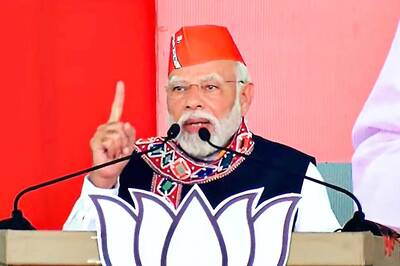
views
ANKARA: Turkish President Tayyip Erdogan pledged a new economic growth strategy on Wednesday based on stability, lower inflation and international investment, a shift in rhetorical gears that sparked a 3% rally in the lira.
Erdogan — who in the past has repeatedly called for lower interest rates — said the strategy would be built on price, monetary and financial stability. There was a need to rebuild both depleted FX reserves and faith in the currency, he said.
The speech to ruling AK Party lawmakers came days after a surprise leadership overhaul in which the head of the central bank was ousted and the finance minister, Erdogan’s son-in-law, stepped down with little immediate explanation.
The comments, including Erdogan’s pledge to personally tell international investors about opportunities in Turkey, could mark a shift from a more combative tone since 2018 that in part blamed foreigners for a halving in the value of the lira.
“We are building a growth structure which creates qualified employment, which does not cause inflation and a current account deficit,” he said. “We will not refrain from implementing the correct recipe, even if it’s bitter.”
The currency soared, touching 7.88 versus the dollar, its strongest level in three weeks. The worst performer in emerging markets this year, the lira struck a record low of 8.58 as recently as Friday.
But it has rebounded more than 6% this week after the weekend departures of the two top economic policymakers.
Former finance minister Naci Agbal was appointed on Saturday to lead the central bank, and former deputy prime minister Lutfi Elvan was named as finance minister late on Monday. Both are longtime AKP members and close Erdogan allies.
In the first concrete step taken under the new leadership, the BDDK regulator on Wednesday relaxed banks’ limits on swaps and other trades in a move that lowers barriers to foreign investors who have sharply cut their holdings in recent years.
Foreign holdings of Turkish bonds have dropped to 3% from more than 25% five years ago in response to a 2018 currency crisis and a series of government policies and rules that complicated offshore hedging and shorting.
Last year, Turkish state banks starved a popular London swap market of lira liquidity, causing trade to dry up.
RATE HIKE DECISION
Turks meanwhile have snapped up hard currencies at record levels amid concerns about negative real rates, high inflation, depleted central bank reserves and the risk of Western sanctions over Turkish foreign and defence policies.
While Erdogan said the positive atmosphere in recent days was a “signal that we are on the right path,” he repeated a frequent assertion that interest rates “are the cause of inflation” and said Turkey would reduce inflation.
That could reinforce concerns about eroded central bank independence ahead of a critical Nov. 19 meeting at which investors expect Agbal to sharply raise the policy rate from 10.25% to support the lira and lower inflation of around 12%.
Erdogan said the bank had a duty to determine policies for price stability.
“Of course we will do all this by not making concessions on the rules of a free market economy, by increasing … transparency, by mobilising domestic and international investors,” he said.
One of Erdogan’s ex-allies who now runs a breakaway party, former economy minister Ali Babacan, said earlier that changes of economic personnel would not be enough to address Turkey’s troubles while Erdogan remains as president.
As part of the BDDK move, limits were raised to 5% of bank equity, from 2%, for transactions with seven days to maturity; to 10% from 5% for those with 30 days to maturity; and to 30% from 20% for transactions of one year to maturity.
One senior banker who requested anonymity said it reflects a new approach and was aimed at making it easier for non-residents to take positions that boost the lira. That should strengthen the efficacy of monetary policy, the banker added.
This year, foreigners have sold $5.8 billion in Turkish stocks and $7.6 billion in debt, while locals have bought $27.4 billion in foreign currency and gold.
After Erdogan’s speech, Turkey’s sovereign dollar bonds strengthened to near five-month highs. Istanbul’s main stock index rose 2.5%.
(Additional reporting by Daren Butler in Istanbul and Tuvan Gumrukcu in Ankara; writing by Jonathan Spicer; Editing by Dominic Evans, Larry King and Catherine Evans)
Disclaimer: This post has been auto-published from an agency feed without any modifications to the text and has not been reviewed by an editor
Read all the Latest News, Breaking News and Coronavirus News here




















Comments
0 comment